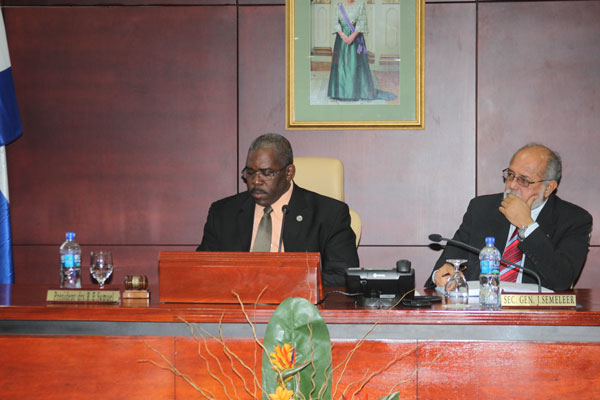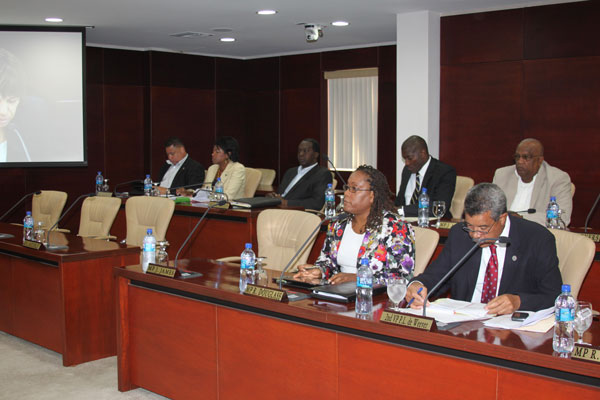 Philipsburg:--- The High Council of State General Audit Chamber provided part of its findings to the parliament of St. Maarten on Thursday, the last working day of the current board. Acting Secretary General Joan Dovale-Meit who was also the former island secretary for St. Maarten presented the first half of the report. The second half of the report will be presented in September when the new board is installed.
Philipsburg:--- The High Council of State General Audit Chamber provided part of its findings to the parliament of St. Maarten on Thursday, the last working day of the current board. Acting Secretary General Joan Dovale-Meit who was also the former island secretary for St. Maarten presented the first half of the report. The second half of the report will be presented in September when the new board is installed.
Dovale-Meit in her powerpoint presentation said that the investigation on government spending began last November and the General Audit Chamber was not given much cooperation when it came to the gathering of information. She said that despite the hardship from the various Ministries, the council managed to produce a report which shows that there is much to be done within the government apparatus regarding its workers. The General Audit Chamber formulated its report which consists of 110 pages after studying 324 files on government personnel.
The General Audit Chamber said in its report that the personnel costs for government is 30% of the annual budget and one of the things the council sought to find out was if government was following proper procedures when hiring its staff. Furthermore, the council wanted to make sure that each civil servant had a complete file and based on the investigation that was not the case. The council realized that 56% of all the personnel files they examined lacked the most fundamental documents. Many civil servants are not even registered at the APNA (pension fund). One of the reasons for this the council said is because the APNA made it mandatory for civil servants to go through certain medical examinations and their advice to government is to see if they can eliminate the medical examination. Registration at the pension fund was only found in 42% of the personnel files. This is a matter of concern for the General Audit Chamber. Despite the fact that deductions related to payment of pension premiums are listed on the wage slips (pay slips), the lack of registration may have major financial implication for Sint Maarten, the audit chamber reported.
 The audit chamber also found 14 files of persons who are registered as civil servants and are being paid by government but they are not the job. Seven of these persons are registered under the Ministry of General Affairs as cleaners. The government of St. Maarten used 92.2% of its budget for 2011 but that percentage could change when the annual accounts are finalized. Another discrepancy the council found is that the high councils of state, including the General Audit Chamber had difficulty accessing its funds because in most cases the monies were placed under the wrong Ministry therefore, these councils only managed to use 50% of their budget for 2011.
The audit chamber also found 14 files of persons who are registered as civil servants and are being paid by government but they are not the job. Seven of these persons are registered under the Ministry of General Affairs as cleaners. The government of St. Maarten used 92.2% of its budget for 2011 but that percentage could change when the annual accounts are finalized. Another discrepancy the council found is that the high councils of state, including the General Audit Chamber had difficulty accessing its funds because in most cases the monies were placed under the wrong Ministry therefore, these councils only managed to use 50% of their budget for 2011.
The audit council wanted to determine if the payments government was making was done lawfully but they were not able to come up with a conclusive answer due to the lack of data. Besides that, the audit council finds that after two years of being a country within the Kingdom of the Netherlands St. Maarten only appointed 66% of the much needed personnel. One of the Ministries that are way below average is the Ministry of Justice who only filled 30% of its mandatory positions. One of the departments that fall under the Justice Ministry and still needs personnel is the MOT. While the parliament of St. Maarten allocated budgets to the various Ministries for personnel and other expenditures such as staffing manuals. The only Ministry that does not have a manual for its staff in place is the Ministry of Justice. The audit chamber said that the manual for the Ministry of Justice is incomplete, two years after St. Maarten's installation as a country within the Kingdom. These manuals are supposed to contain the job descriptions and the formation plans while there must be a section with the legal basis on how civil servants are appointed under both the civil service law and the civil law.
The audit chamber did not find an archive for personnel affairs and in their opinion based on their investigation such an archive does not exist.
The eight parliamentarians present for the meeting posed questions and expressed concerns about the functionality of government. Member of Parliament Patrick Illidge said that he has been speaking about the level of service government has been rendering to the people of St. Maarten and he is particularly concerned about the fact that many of the civil servants were not registered in the pension fund APNA (APS).
Member of Parliament Gracita Arrindell wanted to know how the investigation was conducted and who was responsible for providing the information to the General Audit Chamber. It should be noted that the investigation was also conducted at the Parliament of St. Maarten and the griffier was the one who was interviewed and provided the information on the personnel of the parliament of St. Maarten.
General Audit Chamber should be placed on hold until proper procedures are followed.
 Member of Parliament Petrus Leroy de Weever in his comments said that he is of the opinion that the installation of incoming board of the General Audit Chamber should be placed on hold until the proper procedures are followed. De Weever said that based on the rules of order, all members of high councils of state should be appointed by ballot. MP de Weever said article 64 of the rules of order clearly outlined how the high councils of state must be installed and that is supported in chapter five- article 75 of the Constitution of St. Maarten.
Member of Parliament Petrus Leroy de Weever in his comments said that he is of the opinion that the installation of incoming board of the General Audit Chamber should be placed on hold until the proper procedures are followed. De Weever said that based on the rules of order, all members of high councils of state should be appointed by ballot. MP de Weever said article 64 of the rules of order clearly outlined how the high councils of state must be installed and that is supported in chapter five- article 75 of the Constitution of St. Maarten.
It should be noted that the high councils of state were established for a two year period which ended on August 23rd so that St. Maarten could have met the criteria for becoming a country within the Kingdom of the Netherlands. When the new board is established they will sit for a period of five years making it seven years for each high council of state.
Click here to read the report presented to Parliament by the General Audit Chamber.












